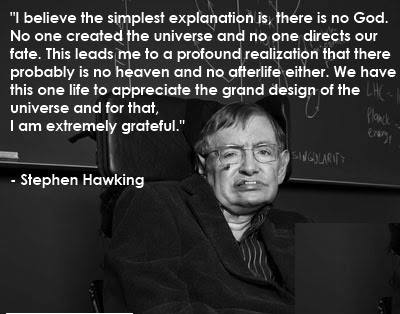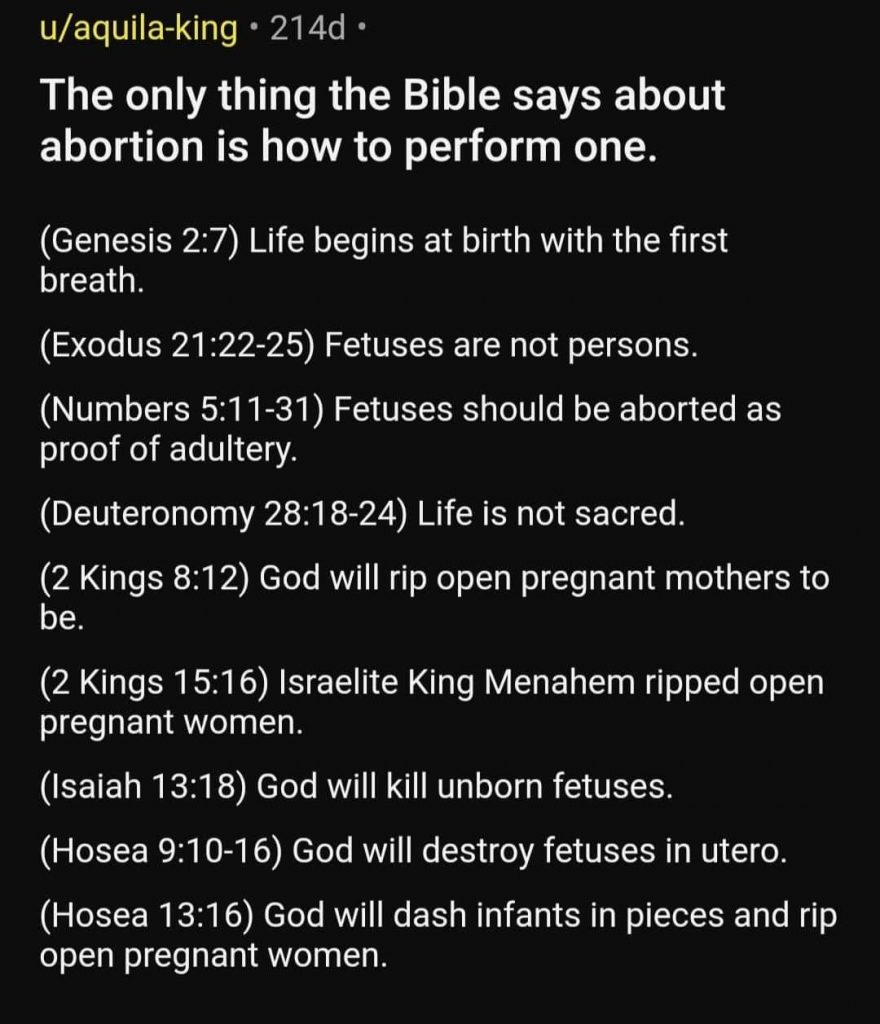[AUTHOR’S NOTE: Hat tip to TC and Emily for serving as inspiration for this article.]
Atheists typically don’t like organized religion, and many will seize just about any excuse to attack the beliefs of theists. Only yesterday a friend of mine posted a political comment on social media that mentioned abortion, yet somehow an atheist lurking in the shadows managed to bring religion into the conversation by claiming the Bible doesn’t condemn abortion. In my response I pointed out that Scripture doesn’t mention nuclear war or space travel either, because those things also didn’t exist when the Bible was written. Elective surgery by a medical doctor to kill an unborn child in the womb wasn’t simply available when Jesus walked the Earth.

His argument was weak, but my new atheist acquaintance was just getting warmed up. Next this particular religion critic boldly claimed the Bible was a work of fiction, which is an odd statement for an atheist to make. Most of my atheist friends realize the best strategy is to remain on offense and attack religion while carefully avoiding any knowledge claims they might have to defend.
For example, most atheists will say something safe like “I believe the Bible is fiction” instead of “the Bible is fiction” because the former is merely stating an opinion, but the latter is a knowledge claim that will ultimately need to be defended with empirical evidence. Everyone is entitled to have an opinion, but not their own independent set of facts. And the fact of the matter is, the claim the Bible is a work of fiction can be easily proved false because some of the ancient history recorded in the Bible has been corroborated by external documentation or archaeological discoveries.
Even though most atheists will adamantly deny they hold any beliefs supported only by faith and the more clever ones will avoid falling into traps such as claiming to know the Bible is false, atheists have beliefs that are implied, even if they do not realize they hold those beliefs.
For example, a large majority of atheists accept the scientific evidence for Darwinian evolution and then seem to assume that if an argument can be made that a modern living organism came to exist without divine intervention (God) then science must have a reasonable argument to solve all other existential problems. And what are existential problems? Those nagging questions like Who am I? and How did I get here?, which often lead to more profound questions like “Why do I exist?” and even “Why was the universe created?” In our youth we tend to give little thought to these questions while we mature and seek a career, but they begin to seem more important as we grow older.
Darwin gave biologists an excuse to become atheists. But what about the physicists and chemists? What progress have they made toward eliminating the need for a supernatural creator God. Not much, if you read what the physicists have written about the origin of the universe and the chemists have said about the origin of life. The Big Bang and abiogenesis are the first two, and arguably most important steps on the path that led to your existence. As I’ve grown fond of pointing out to my atheist friends, life cannot evolve until it exists. Therefore the Big Bang theory and origin of life require some reasonable explanation for how they might have happened without some form of intelligent intervention, especially if you’re choosing to believe that your ancestors shape-shifted from apes into humans.
Science teaches us the universe was created from literally nothing almost fifteen billion years ago, offering evidence known as redshift and cosmic microwave background (CMB) radiation to “prove” their claim our universe continues to expand from a small beginning. The question is no longer whether or not the universe had a beginning, but what caused the beginning, a.k.a. the First Cause. A number of cosmological factors were allegedly “fine-tuned” perfectly so our universe was created, and then there was a perfectly timed and executed period of accelerated cosmic expansion called inflation that immediately followed the Big Bang. Inflation ensured the success of this “Goldilocks” universe necessary for complex life to exist on Earth. Physicist Sir Martin Rees identified the six fine-tuned cosmological factors that allegedly made the existence of our universe possible, and Roger Penrose calculated the odds of our universe being created by chance were astronomically low (pun intended.) The more conservative (best) estimate from Penrose’s calculations can be written as a decimal point followed by three hundred zeros and a one, a grotesquely small fraction of a single percent. One simply cannot make the argument that the creation of our universe from nothing was a likely or predictable event. It might be theoretically possible, but it isn’t very plausible.
The point of mentioning all this is to illustrate what appears to be our binary choice for First Cause–we appear to have only two options. We may choose to believe either God or good luck created the universe, but logically, there is no third alternative. The universe could have been created by accident (good luck), or it could have been created on purpose (God).
Which makes the most sense? Well, if we simply listen to what the experts have to say about the origin of the universe and the origin of life, we can be relatively sure both were extremely improbable events, which is understandable given the problems are creating a universe filled with matter from nothing and then creating life from dead matter. As far as challenging math problems are concerned, they don’t get much tougher than getting a Big Bang to happen through blind luck, which is why multiverse hypotheses became popular due to the statistical probability issues. The odds against this universe being created are so low that scientists were forced to assume an infinite number of universes or infinite number of Big Bang events must have failed, and one succeeded.
Atheists don’t like to think they have beliefs that need to be defended, but the burden of proof falls on the person making an epistemic claim. Because humans have free will, we can choose to believe God created the universe and life within it, or we can believe there is no God, and something else created the universe and life within it.
Anyone who makes any sort of epistemic (knowledge) claim has stated a belief that can be challenged and ultimately must be defended in the arena of ideas, and claiming to know the Bible is a work of fiction is indeed a knowledge claim. One might be able to get away with a lukewarm declaration such as “I haven’t seen sufficient evidence to believe in a supernatural God” but occasionally, one of the more brazen atheists will boast of knowledge that a particular religion (usually Christianity) is false.
Or worse, claim that people who sincerely believe in a religion are suffering from schizophrenia. Frankly, it is rude and foolish to make a medical diagnosis that relies entirely on your own presumptive bias, especially when you aren’t even a doctor. It is an inherently risky proposition, because there is always the danger that some Christian might come along and make arguments that sound lucid and reasonable while making your counterclaims sound foolish and immature, because they are.
Even super-intelligent atheists have conflicted thoughts and implied beliefs–consider the claims of Stephen Hawking shown below, for example.

Immediately after claiming the “simplest” explanation excludes God from creation, in the very next sentence Hawking speaks of the “grand design” of the universe. The simple fact is, designs do not exist without Designers. Hawking’s claim is silly and wrong.
Even the simplest patterns have identifiable designers. Stonehenge was designed–we might not know the identity of the designer(s), but it seems we can safely assume the ancient monument was designed, by inference. Our only other alternative is to assume that Stonehenge could have been formed by natural processes, simply if given enough time, and no experts appear to be making that argument. Well, why not? If we can assume the universe could form without intelligent intervention or direction and assume intelligent life can emerge from non-intelligent processes, why couldn’t Stonehenge have formed by random luck, simply if enough time is made available? Are we supposed to believe some of the most complex and intricate designs in the universe do not have a Designer merely because they are biological organisms, and modern science has become predisposed to assuming atheism is true by default? It isn’t logical to form a biased opinion flatly contradicted by the evidence and to stubbornly refuse to consider the only real and viable alternative. Arguably, it could be a symptom of insanity.
As Penrose established, the odds of a successful Big Bang are extraordinarily low–represented as 1 in 10 300 power. You certainly wouldn’t want to bet on those odds in Vegas.
If that isn’t bad enough, Stephen Hawking estimated the odds of inflation starting and stopping with precision perfection were one in a million-million. You certainly wouldn’t want your life to depend on successfully beating those odds–yet it does, doesn’t it? The universe exists, and we exist. Therefore, the odds must have been overcome, one way or another. The downside of assuming a supernatural creator God solves all these problems is that our evidence of this God’s existence is only circumstantial at best. However, there is no evidence that this sort of luck is possible, either. A mustard seed of faith is required to choose which explanation works best for the individual. Keep in mind, the odds of success for abiogenesis could never get better than the odds of success for the Big Bang and inflation, but they can get even worse. These are compounded improbabilities.
When atheists argue they have no faith-based beliefs, they are mistaken. Whether it is belief in a higher power or one’s own intellect and ability to reason, we can have faith in a God or faith in ourselves. Atheists will vehemently argue against the point, but like it or not, a supernatural God solves all of those nasty probability problems created by their unbelief.
A powerful, supernatural intelligence capable of manipulating time and space isn’t a convenience once we realize that luck is our only alternative. God is necessary, or we must believe that insurmountable odds were overcome because it was theoretically possible.
It has become an either/or proposition–either God exists and created the universe and the life within, or some truly extraordinary good luck did. I’m open to the idea of a third alternative, and after giving the problem considerable thought for the better part of a decade and failing to think what another viable option for First Cause, I’ll be impressed if someone thinks of one and offers reasonable evidence for it.
We know that luck exists, but the sort of luck required to create a universe from nothing and life from inanimate matter? There is less evidence for that sort of luck than there is for a supernatural God. Furthermore, a superior form of intelligence is a much better explanation for the existence of intelligence than blind and stupid good luck.
If there is anything predictable about atheists, it is that they understand the difference between defense and offense, and when all else fails, it’s easy enough to create a few straw man arguments by cherry picking the Old Testament, like so:

For the sake of time (this piece is already quite long) I’m not going to respond to each of these claims because it is almost laughable to think someone would argue Scripture actually condones abortion, but I will give an example of how I do handle this sort of argument. In 2 Kings 15:16 it is true that the Bible describes King Menahem ripping open the stomachs of pregnant women.
The problem with cherry picking verses is if we continue reading, verse 18 clarifies that Menahem “did evil in the eyes of the LORD.” This new atheist acquaintance boasted he had read the Bible from cover to cover. So what? It is one thing to read, and another to comprehend.
I am willing to accept the challenge of any atheist to defend my beliefs, but I will expect them to do the same. I understand that many atheists came to reject belief in God in part because of how scientific evidence has been interpreted as well as perceived flaws and fallacies in Scripture, and will offer this challenge to any interesting parties:
We can have a polite conversation as long as you’d like, under these conditions: you may choose whatever Bible verses you’d like, and I will be happy to share my analysis of the text in the form of a reply in defense of that text with the stipulation that we are exchanging opinions and ideas–I do not presume to speak on behalf of God and I’m not an attorney so I don’t know how adequate any “defense” I might make would be, but I’m willing to go on record and say I can offer a response to every one of those Bible verses listed above, and any others you’d like to have addressed that will be ultimately based on logic and reason. But every time you ask a question and I give you an answer, it will be my turn to ask a question.
It could be a fun experiment, and should be a good learning experience for at least one of us. I’m competent enough at defending the Bible I think, but where I excel is in using scientific arguments to expose the logical flaws of atheism. The beauty of the exchange is that often atheists are completely unaware of the assumptions they must be subconsciously making in order to maintain their current worldview, but I am here and more than happy to help them understand the limits of scientific knowledge and the scope and difficulty of the existential questions.
As Werner Heisenberg, the father of quantum physics, famously said, “The first gulp from the glass of natural sciences will make you an atheist, but at the bottom of the glass, God is waiting for you.”
To which I would add, “Bottom’s up!”
Remember, the next round will be on me.

Speak Your Mind